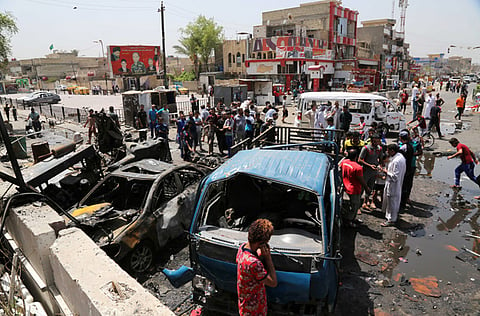UN: More than 1,700 killed in Iraq in July
Latest toll reflects rise in violence in areas now under the control of militants

Baghdad: More than 1,700 people were killed in Iraq in July, the United Nations said on Friday, making it one of the deadliest months of the year but marking a decline from the previous month, when militants swept across the country’s northwest.
The UN mission to Iraq said in its monthly statement that at least 1,737 people were killed in July, down from 2,400 deaths in June, when the Islamic State of Iraq and the Levant (Isil) group spearheaded a lightning blitz that saw militants seize much of northern and western Iraq, including the second largest city Mosul.
But the latest figure is considerably higher than May, when some 800 people were killed, and the latest toll includes an increase in killings in areas now under the control of militants.
Iraq’s large, US-trained and equipped military melted away in the face of the initial militant onslaught, but has since regrouped, and the battle lines largely stabilised last month as the Sunni militants approached Shiite-majority areas.
Calls for Prime Minister Nouri Al Maliki to resign have intensified since the crisis began, with critics accusing him of monopolising power and alienating minority groups.
The Shiite leader has vowed to serve a third four-year term, however, as lawmakers have struggled to agree on a new government that can confront the crisis. Al Maliki’s bloc won the most votes in April’s parliamentary elections.
UN APPEAL
In announcing the latest casualty figures, the UN mission again called on the country’s feuding politicians to set aside their differences and form an inclusive government.
“It is time that they move forward on the creation of a new government that can address the root causes of violence in Iraq and ensure equitable development for all communities,” Nickolay Mladenov, the UN special representative for Iraq, said in the statement on Friday.
The wave of violence continued on Friday, when a car bomb tore through a busy commercial street in Baghdad’s eastern Habibiya neighbourhood, killing seven people and wounding 16, police officials said. Health officials confirmed the figures.
Nearby, in Al Khulani Square in central Baghdad, three bombs exploded almost simultaneously, killing four people and wounding 12 others, said police and hospital officials. All officials spoke on condition of anonymity because they are not authorised to speak with the media.
Baghdad had the highest death toll of any of the provinces in July, according to the UN, with at least 415 people killed. To the north, Ninevah and Salah Al Deen have seen heightened violence since the militants seized parts of both provinces, including their provincial capitals, Mosul and Tikrit, in June.
The UN’s estimates exclude the western Anbar province, parts of which have been held by militants for months.
On Friday in Haditha, a town in Anbar near a strategic dam, Isil militants launched an assault from three different points, using a suicide oil tanker and trucks, Lt. Gen. Rashid Fleih, the commander of Anbar Operations Command, told The Associated Press.
The militants briefly took over an army command headquarters in the town, but the military was able to retake it, Lt. Gen. Fleih said. Ten soldiers were killed in the clashes.
Sign up for the Daily Briefing
Get the latest news and updates straight to your inbox



